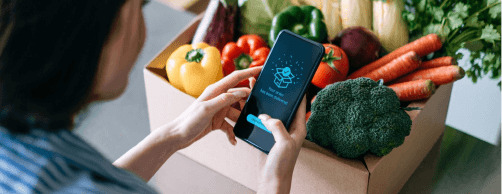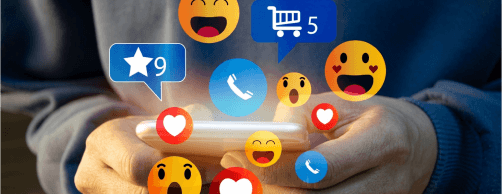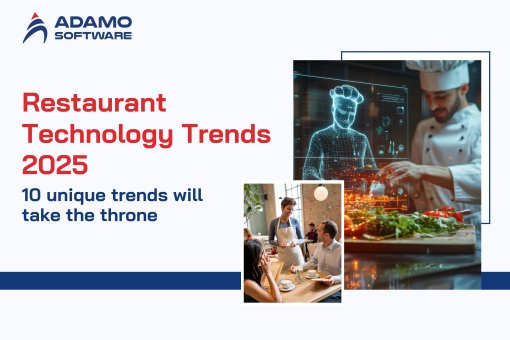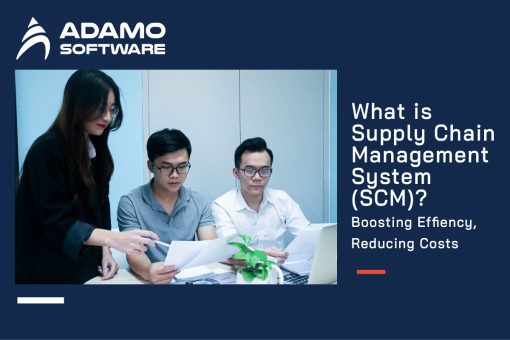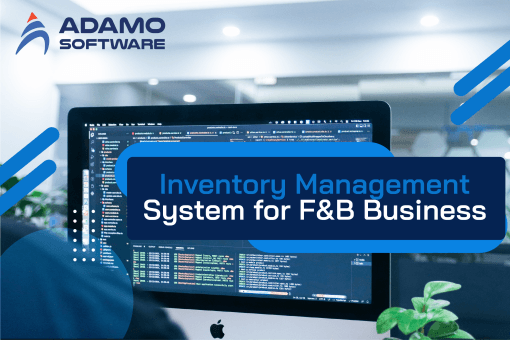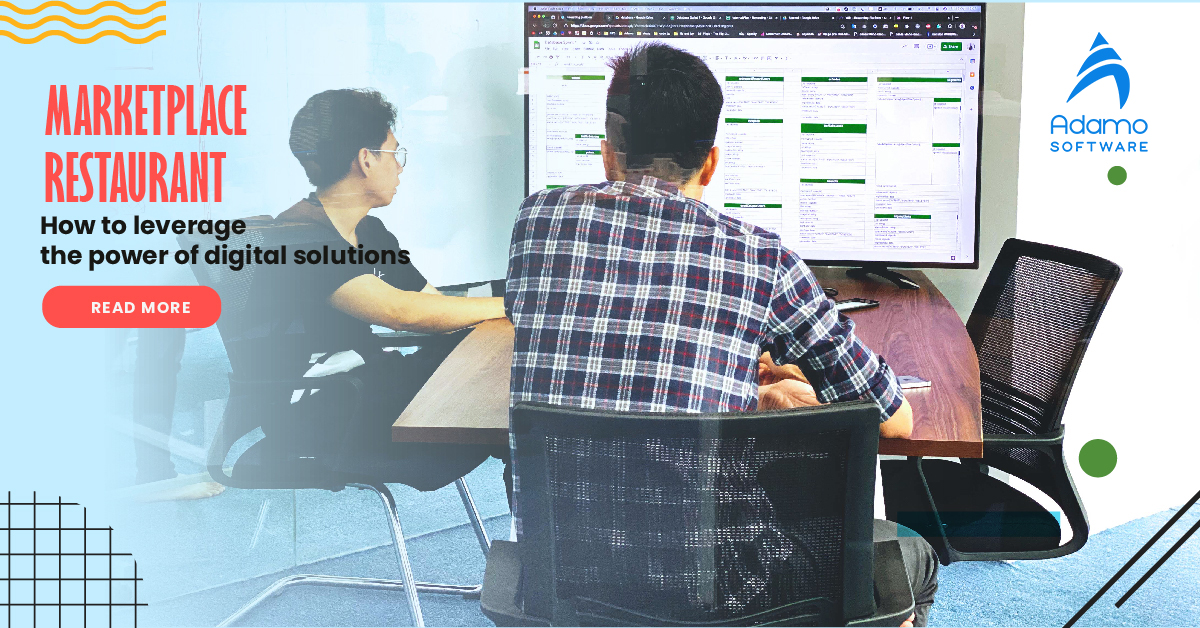What makes Restaurant CRM System the “secret weapon” of restaurant
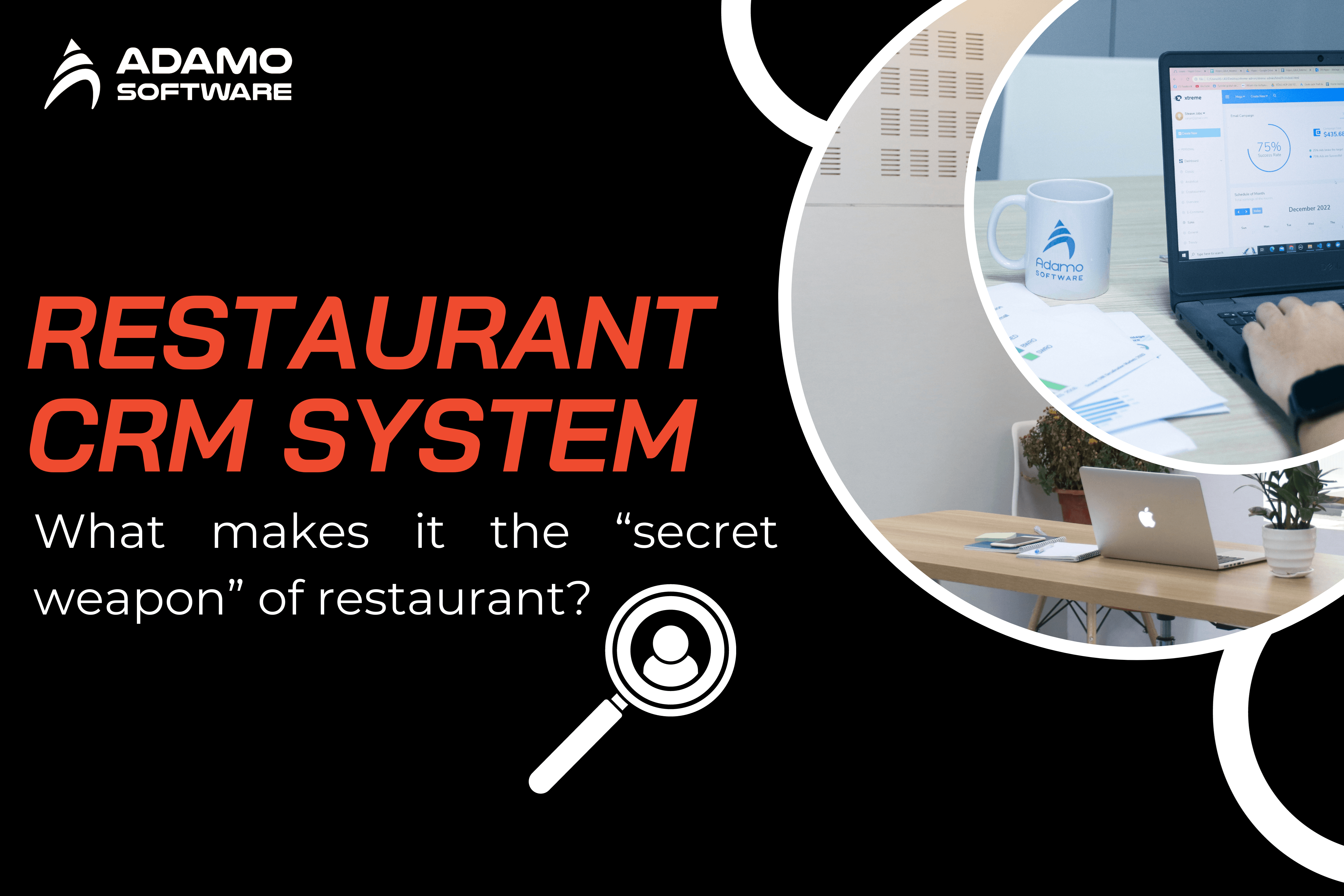
Diners today want individualized experiences, and the only way for restaurants to deliver them on a scale is with a restaurant CRM system.
How can you make your restaurant more lucrative in the face of increased advertising costs, personnel shortages, and pandemic restrictions? No, we’re not talking about going viral on TikTok; instead, we’re discussing restaurant CRMs. Investing in restaurant CRM systems can provide numerous benefits to your company.
The restaurant CRM system is a critical component of many successful restaurants. It may assist restaurant managers in building relationships with each guest to boost customer retention by exploiting extensive guest data. Moreover, CRM may help your restaurant function more efficiently and increase visitor pleasure. How is all of this possible?
I. What is a CRM system?
Customer Relationship Management (CRM) is a system that allows you to manage all your company’s relationships and interactions with current and prospective customers. The idea is straightforward: improve business ties to expand your company. A CRM system assists businesses in staying connected to customers, streamlining procedures, and increasing profitability.
When people talk about CRM, they usually mean a CRM system, which is a tool that assists with contact management, sales management, agent productivity, and other tasks. CRM technologies may now manage customer connections throughout the customer lifecycle, including marketing, sales, digital commerce, and customer support interactions.
A CRM system helps you keep track of your relationships with customers, service users, coworkers, and suppliers throughout the whole lifecycle of the relationship. This includes finding new customers, earning their business, and giving them support and extra services as needed.
II. What is CRM software for restaurants?
A restaurant CRM system is the software they use to learn more about their customers. As a result, they can give them better service and send them more relevant marketing offers.
CRMs are commonly used by restaurants to capture guest information such as:
– Contact information: Typically acquired when a consumer joins a restaurant’s loyalty program or makes a reservation.
– Interaction history: A record of the customer’s orders, reservations, and promotional interactions.
– Preferences: These include food preferences (vegan, vegetarian, etc.), allergens (soy, gluten, dairy, etc.), favorites (chocolate cake, scotch on the rocks, etc.), and table preferences (booth, high top, outdoor table, and so on).
– Notable dates: Birthdays, the date of their most recent visit, and the date they originally joined your loyalty program can all assist you in selecting unique offers.
Restaurant CRM systems, as opposed to CRMs that are not meant for the hospitality sector, are specifically designed to interface with the rest of the technologies in your restaurant’s tech stack. This means that an integrated CRM for restaurants can exchange information with your POS, loyalty program, reservation system, and other systems.
III. Explore benefits of CRM software: Make it a “secret weapon” for restaurants
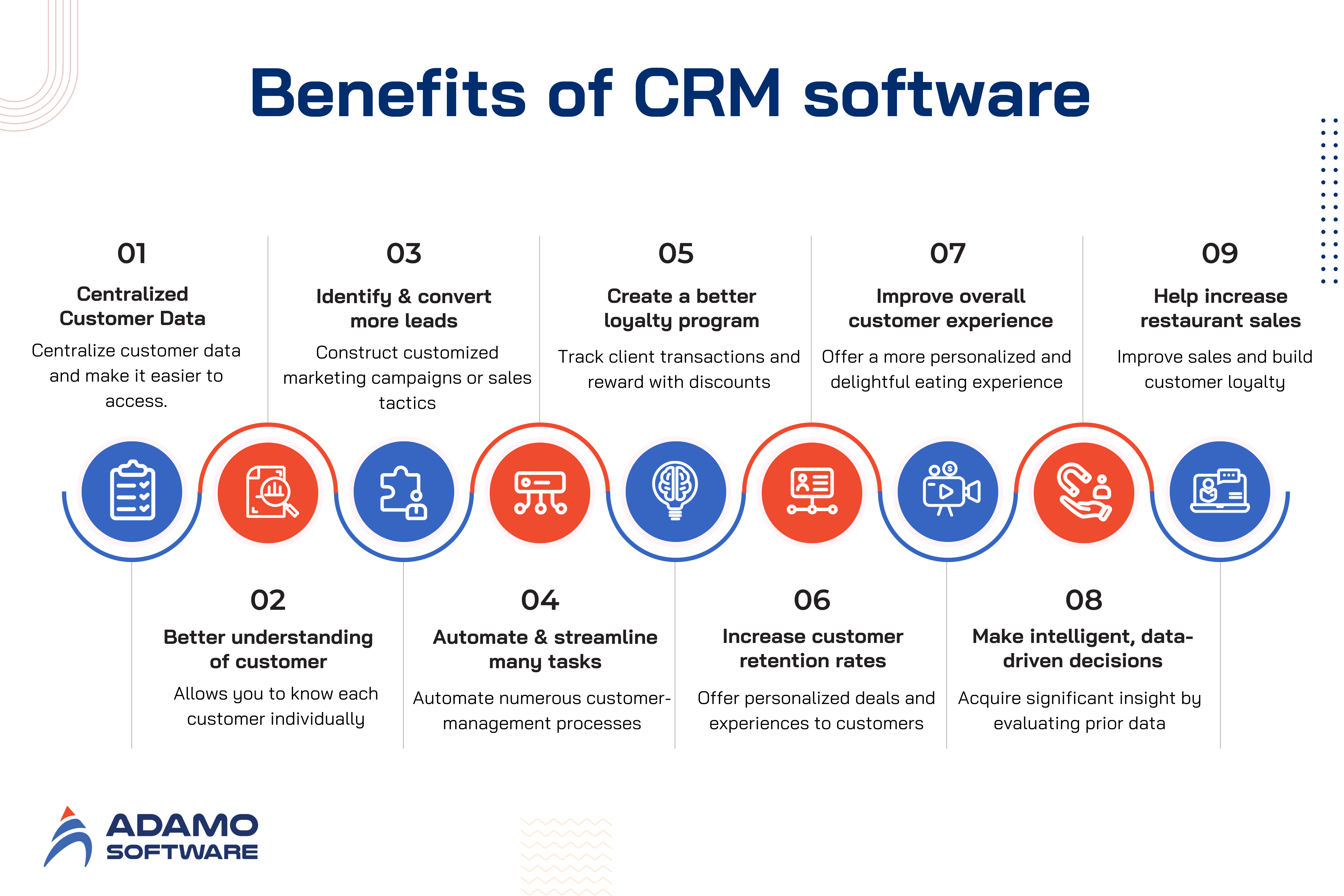
1. Centralized Customer Data
A restaurant CRM system helps to centralize customer data and make it easier to access, whether on-premises or off-premises. Off-premises solutions are hosted by a third-party source and are deployed on a server at the restaurant.
Centralized customer data is significant because it allows organizations to gain a 360-degree view of their customers’ contact information, preferences, and purchase history. This easily accessible data is a significant resource for marketing and sales teams looking to discover trends and target new consumers.
2. A better understanding of customer
A restaurant CRM system provides you with a deeper understanding of your customers as a whole. In addition, it allows you to know each customer individually. You may keep track of their contact information and preferences, as well as their online and in-person experiences with your restaurant. This allows you to give a more personalized customer experience and increase the likelihood that targeted marketing and promotional offers will appeal to specific customers.
Explore prediction role of CRM in our blog How Can CRM Marketing Help Predict A Customer’s Needs?
3. Identify and convert more leads
You may better identify who is interested in your food and services and how to approach them by recording customer interactions and leveraging data from previous contacts with your restaurant. You can use this data to construct customized marketing campaigns or sales tactics that focus on converting the most promising leads into customers.
4. Automate and streamline many tasks
A strong restaurant CRM system may automate and streamline numerous customer-management processes, like contact management, lead tracking, and sales pipeline management. This allows restaurant employees to focus on other revenue-generating activities.
5. Create a better loyalty program
Restaurants may simply track client transactions and reward frequent diners with discounts or other rewards using a restaurant CRM system. This allows you to better understand your clients and design loyalty programs that efficiently retain customers and encourage repeat business.
6. Increase customer retention rates
The average restaurant has just about 30% customer retention. This means that out of every consumer who visits your restaurant, 70% are unlikely to return. However, you can adjust this if you have a restaurant CRM system. You may offer personalized deals and experiences to customers by tracking their behavior and preferences. This will keep them coming back for more.
7. Improve overall customer experience
Restaurants may offer a more personalized and delightful eating experience by employing data to understand consumer needs and desires. This can lead to higher levels of consumer satisfaction and loyalty.
8. Make intelligent, data-driven decisions
Data acquired by a restaurant CRM system can be used to make informed, data-driven restaurant operations choices. You can acquire significant insight into what your customers want and need by evaluating prior data. Then you may utilize that data to make smarter judgments about everything from menu items to promotions and marketing campaigns.
9. Help increase restaurant sales
By better knowing your customers, a restaurant CRM system may help you improve sales and build customer loyalty. Knowing what your clients want and need allows you to more successfully target them with unique messages and offers that they will like. You can also uncover possibilities to upsell or cross-sell more menu items or services by recording client interactions and feedback.
IV. Best CRM software for restaurants: Feature & Pricing
1. Eat App
Key features:
– A centralized database: Restaurant managers may run one or more restaurants more efficiently by collecting and organizing all guest data in one location.
– Advanced guest profiles: Eat App’s restaurant CRM system goes way beyond the basics, collecting rich data such as birthdays, special requests, regular orders, allergies, and seating preferences, allowing for more exact personalized suggestions.
– Customized marketing messages: Eat App’s restaurant CRM system includes segmentation features within the guest database, allowing you to sort, segment and tag clients based on the data gathered.
– An automated survey system: Send a review request to your guests within 24 hours after their reservation, improve your understanding of your operations’ highs and lows, and take prompt action to solve problems accordingly.
Pricing:
Eat App’s all-inclusive system costs $229 per month.
2. Toast
Key features:
– Segmented email lists: You can develop them based on several parameters and send targeted marketing messages to customers. These email campaigns can also be automated and delivered based on visitor behavior. For example, a welcome email when someone signs up or a discount email when someone hasn’t visited the restaurant in a while.
– Analytical insights: The reporting options assist restaurant management in swiftly identifying and resolving difficulties.
– Centralized database: Restaurant operators may find everything they need in one spot instead of juggling numerous applications.
Pricing:
Toast’s marketing software is part of their “Growth” package, which costs $272 per month.
3. Popmenu
Key features:
– All-in-one tool: Popmenu allows restaurants to control the complete guest experience by reducing reliance on third-party ordering websites. Restaurants can collect guest data, segment, and tag customers depending on their activity, and then send automated and personalized messaging.
– Online ordering: Popmenu’s major focus is online ordering, and it provides a streamlined online ordering trip to visitors by providing QR codes, digital menus, reputation management, etc., all under one system.
– Marketing features: SMS and email marketing are streamlined with the use of client data.
Pricing:
The Popmenu basic subscription is $149 per month. However, the whole CRM package is offered with the $349/month Pro package.
4. OpenTable
Key features:
– A centralized database: Gathers all guest information in one location and assists restaurants in segmenting and emailing clients depending on preferences.
– Email marketing: The feature of this restaurant CRM system delivers detailed campaign insights such as ROI, revenue, and covers gained from each campaign.
– Auto-guest tagging: OpenTable’s restaurant CRM system now supports auto-guest tagging, which helps restaurants keep track of their VIPs and other important guests.
– Employee management: This restaurant CRM system has a server management function that delivers insights into server performance using data points such as server ratings, guest feedback, and more to assist you in identifying your top-performing employees.
Pricing:
OpenTable’s basic restaurant CRM system costs $29 per month. However, advanced features such as table management, waitlists, automated email marketing, etc. are only available as part of the Pro package, which costs $449 per month.
5. POSist
Key features:
– Customer database: POSist assists in the creation of a rich guest database by gathering guest data from many sources such as online ordering, guest feedback, and so on. It also includes segmentation capabilities, which enable restaurants to identify and classify consumers based on characteristics such as preferences and frequency of visits.
– Targeted email marketing campaigns: POSist’s restaurant CRM system assists restaurants in sending personalized communications to customers based on their behavior.
– Detailed reporting: Reports are detailed and easy to understand. Therefore, restaurant owners don’t need to know much about analytics.
Pricing:
Because POSist’s pricing is adjusted to each restaurant’s needs, there is no clear pricing package on the website.
6. Upserve
Key features:
– Guest book feature: Assists in the creation of rich guest profiles with various details such as food preferences, typical expenditure, etc., to provide a more personalized customer experience. You can also segment guests based on their behavior to assist in discovering high-value customers in a restaurant.
– A centralized review feature: Combines restaurant ratings from many networks such as Yelp, Google+, OpenTable, and Tripadvisor to assist businesses in managing their reputation. This function also allows restaurants to track the reviews of up to 5 other restaurants to see how they compare.
– Customer support – Upserve’s chatbot is available 24 hours a day, 7 days a week to answer and resolve all questions.
Pricing:
Upserve’s starter subscription is $59 per month. However, the CRM system is unusable without the purchase of its POS system, which costs an additional $60. To use the entire CRM system, you must purchase the PRO subscription, which costs $199 a month plus an additional $50 for the POS terminal.
7. Punchh
Key features:
– Punchh loyalty: The Punch Loyalty feature enables restaurant businesses to develop and manage an omnichannel loyalty program that is linked across several customer touchpoints, such as in-store, online, and via a branded mobile app.
– Punchh offers: The restaurant CRM system may personalize promotions and rewards to particular consumer preferences and behaviors by leveraging customer data insights.
– Punchh marketing: Automated, behavior-driven campaigns that turn first-time visitors into lifelong fans.
– Customer data insights: The platform gathers and analyzes massive amounts of client data, such as purchase history, frequency of visits, order preferences, etc.
Pricing:
Not publicly available.
8. Quandoo
Key features:
– Advanced analytics: With an easy-to-use dashboard, you can gain vital insights and track performance in real-time. Monitor reservations and cover performance, compute revenue from various booking channels, compare data across periods, and generate up-to-date reports for informed decision-making.
– Guest management: Access and control visitor data to provide tailored experiences and establish a community of recurring customers. View reservation history, tag preferences and allergies, and extract guest information for targeted email and social media campaigns.
– Simplified reservation management: Accept, manage, and maximize restaurant reservations with real-time booking capabilities available 24 hours a day, seven days a week. For a smooth and structured workflow, receive instant notifications, centralize all reservations in one list, including walk-ins and phone reservations, and log guest requests and notes.
Pricing:
The monthly subscription charge begins at $50, but the setup fee begins at &750.
9. SugarCRM
Key features:
– Comprehensive customer data: SugarCRM’s restaurant CRM system helps restaurants get better and more accurate customer data by automating data updating and adding information from outside sources. With this full picture of customer data, you can make better decisions and connect with customers in a more personal way.
– Time-aware customer journey: SugarCRM keeps a full history record of all the changes that happen during the customer journey. This helps you understand what’s going on better. This restaurant CRM system assists restaurants in understanding customer preferences and behavior over time. Consequently, they can make better marketing and service plans.
– Omnichannel communications: Restaurants can use SugarCRM to add voice and chat interactions right into their restaurant CRM systems. This seamless omnichannel contact makes it easier to help customers and keep them interested at all of their touchpoints.
– AI-powered predictions: SugarCRM uses AI to make highly accurate, data-driven predictions about consumers and their behavior. This restaurant CRM system helps restaurants analyze their customers’ tastes, uncover cross-selling opportunities, and optimize their marketing campaigns.
Pricing:
Some features are available at $80 per user/month.
10. SevenRooms
Key features:
– Reservation and table management: Handle bookings, changes, and cancellations with ease, while optimizing seating configurations to reduce wait times.
– Guest CRM tools: Improve your understanding of your guests by preserving preferences, visit history, and special requests, allowing for more tailored service.
– Waitlist optimization: Manage “waiting guests” efficiently and automatically notify them when tables become available.
– Insights and analytics: Use useful data about customer behavior, peak hours, and revenue trends to make informed decisions.
– Marketing automation: Build loyalty by engaging guests with customized campaigns, promotions, and tailored offerings.
Pricing:
The typical monthly cost of a restaurant CRM system is roughly $200. However, the feature list will influence the cost of the CRM.
V. Why select Adamo for building CRM software specific to restaurants
Choosing the best restaurant CRM system is a critical decision. If you’re still not sure which one is best for your company, we recommend scheduling demos with many suppliers to compare possibilities.
At Adamo Software, we’d delighted to show you how our restaurant CRM system can provide your F&B business with the tools and information it needs to generate memorable experiences that keep customers coming back. Schedule a demo today!
Restaurant CRM software FAQs
1. Why do your restaurants need a CRM?
A restaurant CRM system enables restaurants to easily collect, store, and manage critical guest data that can be utilized to personalize the guest experience in-service and via marketing communication. This helps restaurants increase customer loyalty and income.
2. What is the best CRM software for restaurants?
There are lots of excellent CRMs available. However, the ideal restaurant CRM system is specifically designed for the food sector.
3. Is CRM system beneficial B2C?
The restaurant CRM system is an excellent instrument for managing and comprehending your B2C customer base. You can learn more about your company by recording their interactions and data. A restaurant CRM system can also assist you in automating and streamlining customer support processes, making it easier to give an outstanding client experience.
4. Do CRM systems benefit B2B?
Restaurant CRM systems are frequently utilized in B2B settings. CRM assists firms in keeping track of their interactions with other businesses and ensuring they deliver the best possible service. A restaurant CRM system may also assist firms in strengthening their relationship with their customers and partners.
The restaurant CRM system can benefit B2B companies for various reasons, such as:
– Assists firms in keeping track of their interactions with other companies. This data is utilized to improve customer service and guarantee that the company’s obligations are met.
– Restaurant CRM systems enable businesses to strengthen their relationships with their customers and partners. As a result, these groups’ sales and loyalty may improve.
– CRM assists firms in improving internal procedures and operations.
CRM with Inventory Management System together help your business enhance operation and boost sales and revenue, explore Inventory Management System: Ultimate Guide for F&B Business
5. What is an example of CRM?
An example of a restaurant CRM system is a corporation recording and managing its contacts with present and potential clients. This comprises sales and marketing data, customer service encounters, and other touchpoints. Monitoring and managing these interactions allow the organization to obtain insights into what its consumers want and need, as well as how to effectively serve them.



